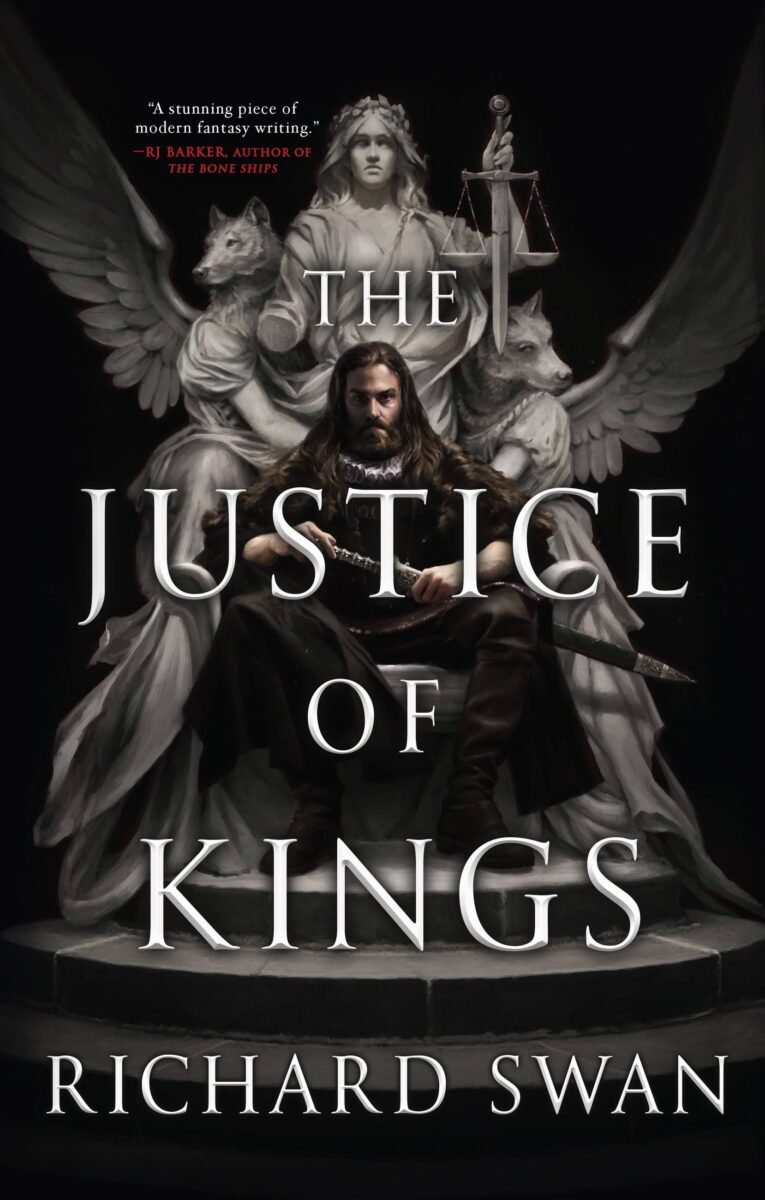As someone who has read a hefty amount of detective novels, I knew precisely what Richard Swan was doing in The Justice of Kings, the first book in his The Empire of the Wolf trilogy. It’s written like a classic Sherlock Holmes or Hercule Poirot in a fantasy setting, with elements of both making up the plot. Sir Konrad Vonvalt is an Emperor’s Justice, a title that is a combined judge, prosecutor, executioner, and, of course, detective. Helena Sedanka is his clerk and the storyteller in this series, telling us the events after they’ve already happened.
Tropes aren’t inherently wrong, it’s how you use them, and Swan takes a lot of the tropes of the old detective novel for this book and places them into his fantasy world to give it a new thrill. Helena Sedanka is the John Watson to Konrad Vonvalt’s Sherlock Holmes, specifically the Watson from Doyle’s The Memoirs of Sherlock Holmes, recording the tale of Vonvalt all the while hinting at something more tragic in his future akin to Sherlock’s downfall against Moriarty at Reichenbach Falls in The Final Problem. Like Watson, she admires Vonvalt’s skills, intelligence, and sense of justice. Being nineteen rather than an adult and having had a rough life before being taken in by Vonvalt, Helena sees Vonvalt as a father figure. However, like any father to a teenager, Helena is caught between her admiration for him and the need to find her own identity, not all about him and what they call canon and common law.
Dubine Bressinger is more like the Arthur Hastings to Vonvalt’s Hercule Poirot. He’s capable, loyal, and a long-time friend to Vonvalt but not on the same level in both rank and skill. As a soldier in the same war often referred to in the book, Bressinger, as a former soldier like Vonvalt, adds pathos early on, so the mystery doesn’t take up the whole book. The book plays with other tropes of detective and crime novels. The local head of law enforcement, Sir Radomir, is none too keen to have Vonvalt in his business but grows to respect his skill and sense of justice until they inevitably work together. The murder Vonvalt and company are investigating takes place in a small town that seems straightforward but reveals a much larger conspiracy.

Unlike good old John Watson, Helena is a far more fleshed-out character with her agency and motivation. At nineteen, she is in a situation of wanting validation from her father figure, Vonvalt, who saved her from a life of poverty, versus wanting to strike out on her own, be her own person, have a life separate from the kind she’d lead as an Imperial Justice. Like any teenager, she struggles with her identity, unsure of who she is and what she wants out of life, making for a compelling storyteller. Her education with Vonvalt makes her highly rational. Still, it clashes with the irrationality of what it’s like being a teenager, such as falling fast in love with a boy she just met and deciding to marry him before thinking about what that might mean for her apprenticeship afterward. Helena’s internal and external conflicts does well to avoid the risks of being a one-dimensional narrator talking about the more interesting co-protagonist the whole time, such as is the case sometimes with Watson and Holmes.
The parallel story of politics of a fantasy empire happening while Vonvalt tries to solve this murder elevates the book from a detective-style murder mystery to the political and moral tragedy one would expect from a George R.R. Martin or a Joe Abercrombie. The resolution of the murder mystery is tragic in its own right, tricking the reader into believing that it is the climax of the book, and what’s left is only resolution, only for the real climax to hit like a ton of bricks. The book’s climax is the kind of high tension that made me believe the co-protagonists, Helena and Vonvalt, might not make it out of the book even though Helena is technically telling us the story from the future. It’s emotionally intense as events spiral so fast and places Vonvalt and company in a situation where the moral superiority of the Imperial Justices is put into question. Helena, in the past, is witnessing the catalyst for the events. Helena of the presents hints does not end well in the least.
After the events of the ending, I am intrigued and excited about how the future books in this trilogy will continue to blend mystery with fantasy because the status quo is far removed from what it was even a few chapters before the end. The Justice for Kings isn’t doing anything new but what it does it does excellently. It feels fresh because it uses familiar narrative tropes of political fantasy and detective mystery and blends them in new ways. One of fantasy’s greatest strengths is that it doesn’t have to be just one thing, it can contain multitudes like The Justice of Kings does, and because of that, the first book in The Empire of the Wolf trilogy shines.
What works: A murder mystery mixed with fantasy politics with intelligent and multi-dimensional characters.
What doesn’t work: Though the framework is well done it makes Helena’s decisions in the book a forgone conclusion.
Who is this for: Readers who enjoy detective novels, fantasy politics, mystery, and crime-solving.
Joshua was provided an advance copy of the book by Orbit books.
If you liked this review, please consider buying the reviewer a coffee.
Follow Joshua MacDougall @FourofFiveWits on Twitter and listen to him talk about books with fellow cast members on No Page Unturned Podcast
